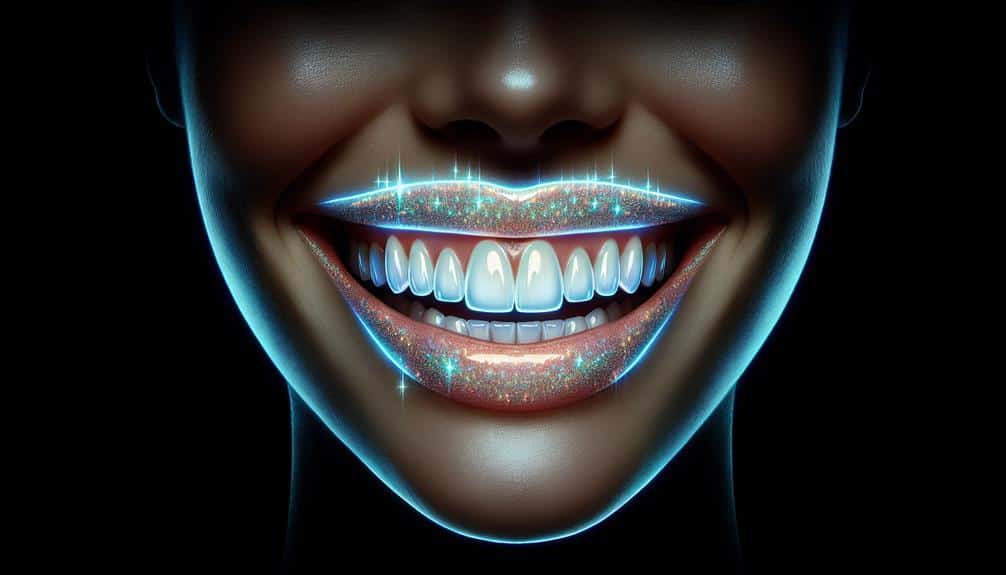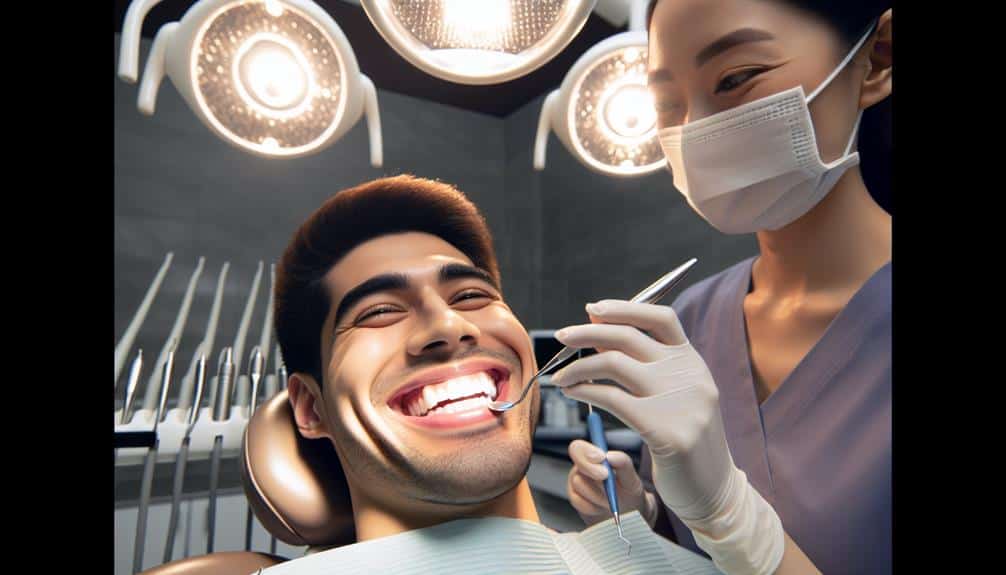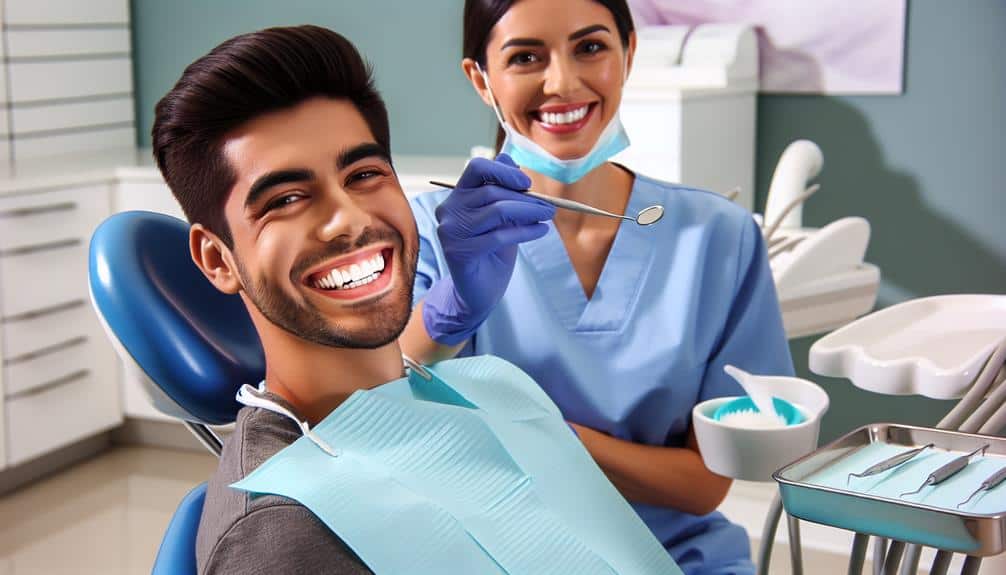To maintain lasting professional whitening results, prioritize a thorough oral care routine including brushing, flossing, and regular dental visits. Be mindful of dietary choices to preserve whiteness, opting for stain-preventing foods and using straws with teeth-staining drinks. Comply diligently with aftercare guidelines like avoiding foods that discolor teeth and utilizing whitening toothpaste for surface stains. Establish a touch-up schedule every 6 months to a year for sustained brilliance. Additional insights on maintaining a radiant smile await you in the detailed guide.
Key Points
- Maintain oral hygiene with regular brushing and flossing.
- Avoid teeth-staining foods and beverages for lasting results.
- Consider touch-up treatments every 6 months to a year.
- Use whitening toothpaste and follow aftercare instructions.
- Consult your dentist for safe and effective whitening touch-up options.
Benefits of Professional Whitening Treatments
When considering professional whitening treatments, you can expect superior results compared to over-the-counter products. Professional treatments are performed under the supervision of trained professionals, ensuring a higher level of effectiveness and safety. The use of professional-grade whitening agents leads to more significant improvements in the brightness of your teeth, resulting in a whiter and more radiant smile. This enhanced whitening capability translates to improved appearance, as the professional treatment can target stubborn stains and discoloration that over-the-counter products may not effectively address.
Furthermore, professional whitening treatments often lead to increased confidence. The psychological impact of having a brighter smile can boost self-esteem and positively influence how you perceive yourself. Research has shown that individuals with whiter teeth tend to smile more frequently, projecting an image of confidence and approachability. By opting for professional whitening treatments, you're investing in not just the aesthetics of your smile but also in your overall sense of self-assurance.
Factors Affecting Whitening Treatment Longevity
Factors influencing the longevity of whitening treatments can vary depending on individual habits and maintenance routines. The effectiveness of the whitening product used plays an important role in how long the results last. Professional whitening treatments tend to show longer-lasting results compared to over-the-counter products due to their higher concentration of whitening agents.
Additionally, diet plays a significant role in maintaining the whiteness of your teeth. Consuming foods and drinks that are known to stain teeth, such as coffee, tea, and red wine, can accelerate the fading of the whitening effects.
Furthermore, lifestyle habits such as smoking can also impact the longevity of whitening treatments. Tobacco products contain substances that can cause teeth discoloration, counteracting the whitening process. Proper oral hygiene is essential for preserving the results of the whitening treatment. Regular brushing, flossing, and dental check-ups can help prevent the accumulation of stains and maintain the brightness of your smile for a longer duration.
Tips for Maintaining Whitening Results
To maintain the longevity of your professional whitening results, it's important to adhere to a diligent oral care routine and make mindful dietary choices.
When it comes to diet choices, be cautious of foods and beverages that can stain your teeth, such as coffee, tea, red wine, and dark-colored berries. If you do consume these items, consider using a straw to minimize contact with your teeth. Additionally, incorporating crunchy fruits and vegetables like apples and carrots into your diet can help naturally clean your teeth by stimulating saliva production and scrubbing away plaque.
In terms of oral hygiene, continue to brush your teeth at least twice a day and floss daily to prevent the buildup of plaque and stains. Consider using a whitening toothpaste to help maintain your results. Regular dental check-ups and professional cleanings are also essential in preserving your whitening effects.
Understanding Whitening Aftercare Instructions
Maintaining your professional whitening results requires diligent adherence to specific aftercare instructions provided by your oral care provider. Effective techniques for post-treatment care are vital to prolong the longevity of your whitening results. One key aspect of aftercare is avoiding foods and beverages that can stain your teeth, such as coffee, tea, and red wine. It's also recommended to refrain from smoking to prevent discoloration.
Additionally, using a whitening toothpaste can help maintain your results by removing surface stains. Brushing and flossing regularly are essential habits to uphold, as they prevent the buildup of plaque and maintain the brightness of your smile. Your oral care provider may also recommend occasional touch-up treatments to guarantee your teeth stay radiant.
Following these aftercare instructions diligently won't only preserve your professional whitening results but also contribute to the overall health and appearance of your smile. Remember, consistency in care is key to achieving and maintaining a bright, white smile.
Schedule for Professional Whitening Touch-ups
For important maintenance of your professional whitening results, establishing a regular schedule for touch-up treatments is essential. The touch-up frequency can vary depending on individual habits and diet but generally ranges from every 6 months to once a year. This regular maintenance helps to keep your smile bright and prevent significant staining from setting in. The touch-up cost is typically lower than the initial whitening treatment, making it a cost-effective way to maintain your bright smile over time.
When considering touch-up products, consult with your dentist to make sure you're using safe and effective options. Touch-up techniques may involve at-home kits provided by your dentist or in-office treatments for a more immediate result. It's important to follow the instructions provided by your dental professional to achieve the best outcome.
Frequently Asked Questions
Can Professional Whitening Treatments Cause Tooth Sensitivity, and How Can It Be Managed?
Experiencing tooth sensitivity after professional whitening? It's common and manageable. To ease discomfort, use desensitizing toothpaste, avoid hot/cold foods, and follow your dentist's post-care instructions. Prevention includes proper oral hygiene and regular dental check-ups.
Are There Any Foods or Drinks That Should Be Avoided After Professional Whitening Treatments to Maintain Results?
After professional whitening treatments, avoid consuming dark-colored foods and drinks like coffee, red wine, and berries to maintain results. Using whitening toothpaste regularly can help preserve the effectiveness of the treatment, but it has its limitations in preventing deep stains.
How Long Should I Wait Before Consuming Dark-Colored Foods or Drinks After a Professional Whitening Treatment?
How soon can you enjoy those dark-colored favorites post-whitening? To maintain those pearly whites, wait at least 48 hours before indulging. Timing restrictions are essential for stain prevention and long-lasting maintenance of your professional whitening results.
Is It Safe to Use Over-The-Counter Whitening Products in Between Professional Whitening Touch-Ups?
Yes, it's safe to use over-the-counter whitening products in between professional touch-ups for whitening maintenance. DIY whitening options can help prolong the results. However, consult your dentist for guidance on the most effective and safe products.
Can Professional Whitening Treatments Affect Dental Restorations Like Fillings or Crowns?
When you undergo professional whitening treatments, it's important to take into account the compatibility with your dental restorations like fillings or crowns. Some whitening methods may impact these restorations, potentially affecting their effectiveness or appearance.



